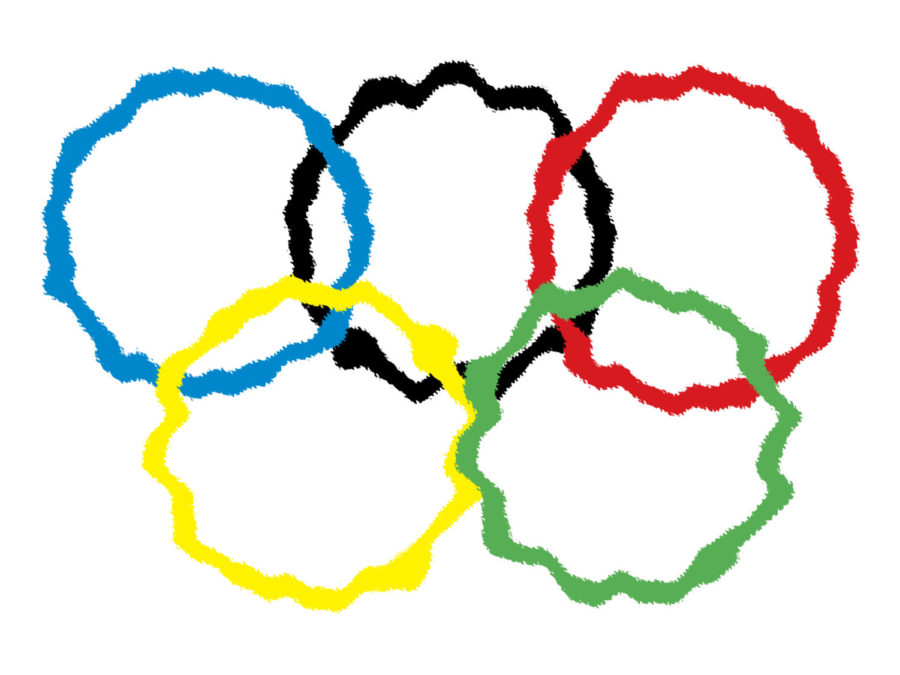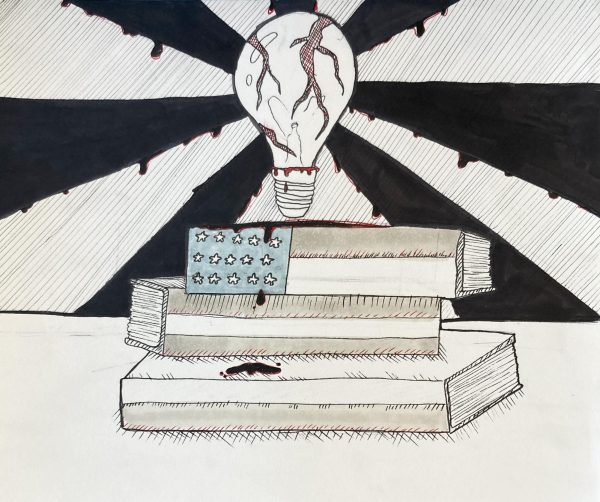PyeongChang Controversies Will Persist
March 8, 2018
The Olympics: pageantry, patriotism, and hopeful eyes from all over the world concentrated on the world’s best athletes. However, it seems that at every Olympics, the bedazzled costumes and fierce smiles are swept up in some wave of controversy, or even crime.
In 1948, after World War II, Axis powers Germany and Japan were banned from the Olympics. In 1972, eleven Israeli athletes were taken hostage and murdered by the Palestinian terrorist group Black September. In 1980, the United States, along with several other countries, boycotted the games in Moscow to protest the Soviet Union’s invasion of Afghanistan.
Even something a bit less dramatic makes world news, such as in 1988 when Ben Johnson, a Canadian sprinter, was stripped of his gold medal for a positive test of the steroid Stanozolol.
2018 also had its share of scandals, according to a myriad of news reports.
The Flag Bearer
One of the first altercations of the 2018 Olympics did not even have to do with a sporting event, but with a flag. Both Shani Davis, a speed skater, and Erin Hemlin, a luger, were nominated to bear the U.S. flag. A vote took place in each of the eight winter sport categories: biathlon, bobsled and skeleton, curling, figure skating, hockey, luge, ski and snowboarding, and speed skating. Both Davis and Hemlin got four votes, making it a tie. A coin toss was then used to decide the victor. A quarter spun in the air, and it favored Erin Hemlin, two-time world champion and four-time Olympian. She was the sixth woman in 23 games to carry the flag. But Davis called the process “dishonorable,” in a tweet. He did not attend the opening ceremony. (A spokesperson stated that the ceremony interfered with his training program.)
Russian Doping
Russia has a long history of Olympic doping scandals. The country has had 41 Olympic medals stripped for doping violations, and it appears that there will be one more in the curling category. Alexander Krushelnysky tested positive for Meldonium, a performance enhancing drug, after his team won bronze. According to the Russian delegation, Russian Sports Minister Pavel Kolobkov claims that Krushelnysky could not have taken the drug intentionally, arguing that the concentration was so small it would not have had any effect on his performance. This scandal is even more complicated given Russia’s history. Russia was technically banned from the PyeongChang Olympics because of a state-sponsored doping operation at the Sochi Olympics in 2014. Russia itself did not participate at PyeongChang; rather, the Olympic Athletes from Russia (OAR) competed under the Olympic flag and the Olympic anthem.
Religious Statements
During a practice run, Israeli skeleton slider A.J. Edelman wore a helmet with Samson, a biblical figure, depicted on it. The International Olympic Committee banned the helmet from competition, saying that political or religious statements are not allowed at the Olympics, citing the possibility of propaganda. (There was even some debate over whether Team USA could wear helmets with the image of Lady Liberty on them.)
The Russian Figure Skater
Alina Zagitova raised questions about fairness in judging with the layout of her figure-skating routines. She did every one of her jumps in the last two minutes of her performances to gain a scoring advantage. (A 10 percent bonus is awarded for jumps in the last half because the judges reason that skaters’ legs will be weary after attempted jumps in the first part.) Zagitova skated around the ring in the first part of her performances, doing a few moves, but once the two-minute mark hit, she jumped like crazy. As Audrey Weisiger, coach of two-time Olympian Michael Weiss, put it, “She killed time in the beginning and then just jumped the second half.” Some praise Zagitova for her wits in using the system to her advantage while others condemn her for tainting the art of figure skating with unappealing tactics.
Kim Yo-Jong
Kim Yo-Jong, Kim Jong-Un’s sister, got a lot of attention at the games, drawing both encouragement and controversy. Many called her “the Ivanka Trump of North Korea” and applauded her antics, such as scowling at U.S. Vice President Mike Pence. Many also praised her dignified and controlled manner despite the disposition of her brother, North Korea’s leader. For example, she left this message when she signed a guest book: “I expect Pyongyang and Seoul to get closer in the hearts of our (Korean) people and the future of unification and prosperity will be advanced.” Some were impressed at her seeming lack of makeup, her “strong woman” persona, and her willingness to smile. But many scold the public for endorsing this “menacing” political figure who supports and participates in the leadership of an oppressive country with a brutal regime. Buzzfeed News released a statement titled, “PSA: Kim Jong Un’s Sister Is Not Your New Fave Shade Queen. She’s A Garbage Monster.”
Shaun White
Snowboarder Shaun White was under a great deal of scrutiny at the games, for both mistreatment of the American Flag and sexual harassment. In the victorious moments after he won the gold medal in halfpipe, White pulled out an American flag to triumphantly wave around but then let it drag behind him on the ground, violating the code that an American flag should never touch the ground. This caused audience anger and led to his public apology. The second issue dealt with sexual misconduct allegations that were brought to light in 2016. Though few seemed to notice when he settled the lawsuit last year, because of recent outrage over sexual harassment cases in the news, White faced much disapproval over the situation.
Olympic Venue
Before the Olympics even started, there was strife over where the games were set to take place. People debated whether to attend or not, given the proximity to North Korea with its missile launches and nuclear tests that were conducted during the summer. Some countries, specifically Austria, Germany, and France, even demanded extra security in exchange for their participation in the games, though none of them ended up boycotting. Though some thought the concerns were unnecessary, there was in fact a cyberattack at the start of the games. The PyeongChang Organizing Committee released a statement saying that before the opening ceremonies, the Internet protocol televisions in the Main Press Centre malfunctioned. The Olympic website was shut down, but the ceremonies went on as planned. Recently, U.S. intelligence found that the perpetrator was a Russian spy who tried to frame North Korea for the incident.
Overall, many people would agree that sports are an essential part of human entertainment and are enjoyable in most respects, but quite often they drift into controversial territory, especially when high-stakes competition is involved. Some enjoy the disputes as well as the athletics while others condemn it. But like most events that contain rivalry, opposition, and opinionated individuals, controversy seems to be inevitable.












